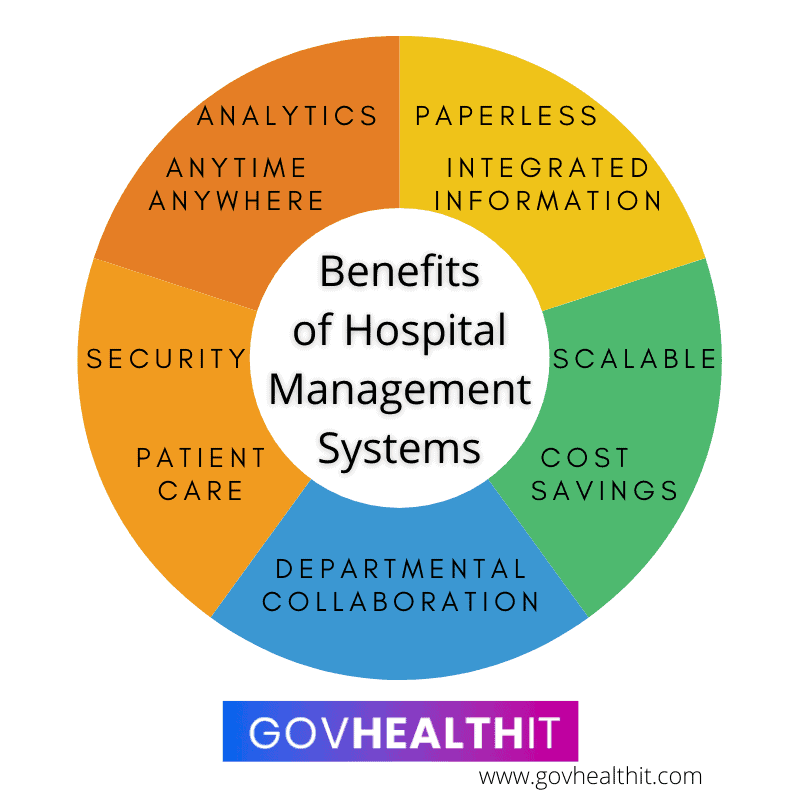
Good hospital management can be the difference between a well-maintained and operated hospital and a chaotic environment where the quality of patient care suffers.
In every health care setting, including hospitals, coordination is the soul of hospital management. Hospital management relates to all aspects of a hospital; a coordination of all elements of a hospital. This may range from patient care to record keeping to inventory of medicines and cleanliness. To be able to become a hospital management professional, this requires taking care of each and every element of the hospital.

Let’s take a deeper dive into hospital management, hospital management systems and the many benefits of it all.
What is Hospital Management
Hospital Management is the process where healthcare providers effectively and efficiently administer everything from patient registration to appointment scheduling, document management, consultation management, lab management, drug safety, report generation, staff management, outpatient management, and so much more.
Good Hospital Management starts by ensuring anytime availability, anytime accessibility and high quality healthcare to the patients.
Hospitals and clinics strive for excellent care but it can be difficult to achieve all of the above without the proper procedures and systems in place.
Hospitals and clinics are complex and have different departments, specialties, schedules, teams, types of data, and so much to manage.
Throw in a growing desire for patients to want more control over their data, scheduling, and access to records, and you can quickly see how hospital management isn’t as easy as it sounds!
Some hospitals might be operating under outdated systems while others are still using a paper-heavy hospital management system.
The problem with outdated systems and paper focused hospital management is that things can get physically lost, errors can occur and patients simply do not have a way to access their information anywhere, anytime.
This is where the rapidly growing Hospital Management System (HMS) comes into play.
What are Hospital Management Systems (HMS)
Several research organizations are projecting that Hospital Management Software Systems are going to expand rapidly, with the US and Canada leading in popularity of maintaining digital health records and better hospital management.
There is no doubt that Hospital management software systems will have an intense impact on the healthcare industry in the years to come. There are so many benefits for hospitals and healthcare providers as well as better care for patients and an overall cost savings.
A Hospital Management System (HMS) can come in a few different product types like cloud based, on-premise, free, paid and open-source hospital management solutions.
The Hospital Management System enables hospitals, healthcare centres and staff to function systematically and manage information effectively to offer better patient care. The system integrates all information and data related to doctors, patients, staff, and departments and provides a way to securely and seamlessly streamline processes and care.

|
Benefits of Hospital Management Systems (HMS)
Hospital management systems also manage other departments such as housekeeping and laundry, blood bank, ambulance services, laboratory services, pharmacy, waste management, nursing and ward, Causality, and more. |
Benefits of Hospital Management Systems
For Doctors
|
For Patients
|
For Hospital Staff
|
For Hospital Administrators
|
For Hospital Owners
|
|
To consistently run business, hospitals and healthcare organizations must keep both the present and the future demands in sight and must adapts to changes. Change is never easy but integrating technology with hospitals to collect, manage and exchange data and monitor patients more effectively will help in creating a well-organized healthcare system, saving time, energy and cost for patients, doctors and hospital staffs. In fact, hospitals that have implemented Hospital Management Systems have reported the following results:
As you can see, there are so many benefits to implementing a hospital management system that will enable you to connect with patients, streamline processes and procedures, and take patient-centred care to a whole new level. |

|
Top 9 Hospital Management Tips

|
Effective management is the key to success for any business and the same can be said for the management of hospital systems. Here we explore the top nine management tips to running your hospital successfully. 1. Training of Hospital StaffNew staff introduced to the hospital must be competent hospital managers. Hospital staff should be encouraged to participate in ongoing training to enhance their skills. Current staff should, therefore, be trained in both management and technology (e.g. cloud image storage), with training also being offered in-house. 2. Use Innovative TechnologyAutomation of hospital systems can be beneficial to everybody involved. For example, the use of DICOM or cloud image storage can reduce the number of staff required and eventually lead to the more effective management of these areas of the hospital. 3. Accountability is KeyStaff should be accountable for their daily, weekly and monthly tasks. If every hospital staff member adheres to this and is answerable for their assigned tasks, including senior doctors, this produces better hospital management. 4. Establish a Managed Care SystemA managed care system should already be implemented in hospitals, but its improvement can lead to the more efficient running of daily tasks. This includes punctuality of physicians, no delays for operations and well-managed stock for in-demand medicines. 5. Develop an Effective Communication StrategyCommunication can be a challenging area for hospitals, however, not addressing a lack of communication can create poor management. Communication channels should be customised according to the needs of the hospital. |
6. Identify Vulnerable Areas
It is important to know where your hospital has been failing. It is only by identifying these areas that you can then focus on the areas that are vulnerable and work to strengthen them. The most qualified staff can then be applied to these areas to ensure effective management.
7. Keep Contact Details Updated
The information of hospital staff can change without the hospital knowing. Therefore, it is important to update the staff’s contact details as out-dated information can affect the patient and demonstrates inefficient management.
8. Oversee Important Departments
Departments such as the emergency department and admissions may require more attention in your hospital. Good hospital management is making sure that the best people and systems are operating efficiently in these areas.
9. Remain Patient-Centred
Regardless of any innovative actions you plan to initiate in your hospital, the main priority should always be the patient. Communicative staff or the latest technology will not matter if the patient is suffering. Therefore, effective hospital management lies in remaining patient-centred.
So if you’re looking for an HMS for your community based hospital, check out Castellan Systems’ Celador. It provides many features and is available at no cost for such facilities.
This article is based on material originally published on https://www.govhealthit.com and on https://healthmanagement.org
Copyright 2020 © GovHealth IT
info@govhealthit.com
Copyright 2021 © HealthManagement.org
166 Agias Filaxeos, Office 204, CY-3083 Limassol, Cyprus

